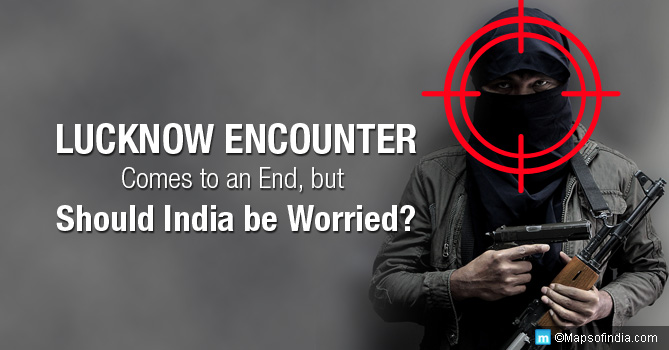ISIS terror has reached India and it was confirmed with the IED blast on Bhopal-Ujjain Express train on March 7, 2017. Nine people were injured with several people jumping out of the moving train in panic. The blast has been attributed to ISIS Khurasan module and is a first for ISIS in India. What followed was almost like a script out of a Bollywood film. Here is what really happened.
At 9 am on Tuesday, March 7, there was a blast on Bhopal-Ujjain Express that triggered off a massive coordinated manhunt by the Madhya Pradesh (MP) and Uttar Pradesh (UP) police. At around 1.30 pm, three terrorists, Danish Akhtar aka Jaffar, Aatif Muzaffar aka Al Kasim and Syed Mir Hussain aka Humza, were arrested from a bus in Pipariya in MP and taken to Hoshangabad for interrogation. The first two belong to Kanpur, while the latter hails from Aligarh.
The UP Anti-Terror Squad (ATS) swung into action arresting two brothers from Kanpur, Mohammed Imran aka Bhai and Mohammed Faisal. They arrested a third suspect named Fakre Alam aka Rishu of Etawah.
By 2.30 pm, UP ATS carried out a second raid on a house in Haji Colony in Lucknow. One terrorist, Mohammed Saifullah locked himself inside and began firing at the ATS squad. The siege extended till 3 am in the wee hours and ended with him being killed. ATS tried their best to get him to surrender by using tear gas and chilli bombs to flush him out, but he refused.
As per Additional Director General of Police (ADGP, Law and Order) Daljit Chaudhary, 8 pistols, 650 rounds of ammunition, 50 expended bullets, several SIM cards, three passports, one railway map, cash and gold were recovered from Saifullah’s rented home.
His family has since refused to accept his body stating he was a traitor to the nation. The families of other suspects arrested have claimed their innocence.
The Real Target
According to ADGP Chaudhary, the ISIS Khorasan module had carried out this attack as a dry run and they were planning bigger attacks to inflict maximum damage. On their target radar was the famous Sufi shrine Dewa Sharif and the Imambara in Lucknow. They also planned to attack the Shia community as and when they gathered for special occasions.
Tracking the Terror Modules
Home grown and net-inspired ISIS modules have been coming up in India with several cells having been busted by alert central and state security agencies.
In early 2016, the National Investigation Agency (NIA) conducted several raids and detained 14 ISIS sympathisers in Hyderabad. In June the same year, NIA conducted multiple raids across Hyderabad and arrested over 10 suspects.
The initial tip-off that triggered raids by MP and UP police last week came from Telangana Police, which had been tracking terror activity in the state for some time.
Time for India to Come Out of Self-Denial
Internationally inspired home grown terror is a reality in India and it is time the central government and all state governments wake up to this reality and take preventive actions immediately.
For too long the nation has been held hostage to self-serving politicians who have been maintaining an ostrich-like stance on terror modules growing in the country. Politicians from all parties have been hesitating to publicly accept this reality and most states have been living in denial.
States where Islamic fundamentalism has already taken deep roots include UP, Telangana, Kerala, West Bengal and Jammu and Kashmir. This is now spreading slowly but surely into other states.
Parties like the Congress, Left Front, Samajwadi Party in UP, JD(U) in Bihar and TMC in West Bengal have all followed a minority appeasement policy that has overlooked radicalisation that has been quietly expanding and setting roots in several regions. Fortunately, the ISIS Khorasan module was busted early and thus, prevented serious damage that could have followed.
What Can the Government Really Do?
Reach out to the Muslim community
Contrary to popular perception, majority of Muslims in India abhor violence of any kind and are as patriotic as any other Indian. The problem lies in community pressure that prevents these moderate Muslims from speaking out against the fundamentalists.
The government needs to reach out to these moderate elements and offer all the assistance and support they need, so that they get the confidence to offer developmental programs and initiatives as a confidence-building measure to isolate the fundamentalists within the community.
Encourage Madrasas to expand
Madrasas must be encouraged to expand the curriculum from just religious texts to other mainstream subjects. This will meet their overall objective of religious learning and also produce students who will be better prepared to take on employable tasks as they reach adulthood.
Increase intelligence gathering and surveillance
This requires long-term vision, planning and execution, besides significant funds. Today, with the help of technology, it is possible to track, monitor and intervene well before a violent incident takes place.
Developing human assets within the community takes time and patience but pays off handsomely in the long run. Both Mossad and Shin Bet of Israel, and Scotland Yard of UK, are good examples of using this strategy. The idea is to prevent an incident taking place rather than acting after the incident. Intelligence is the soul of that effort.
Modern equipment and better training needed
Government’s callous approach to terror is seen in the fast boats acquired after the Mumbai terror attacks that lie rotting due to lack of funds. Security agencies across India continue to risk their lives with limited and poor quality bullet-proof jackets; and one can’t miss the hilarious sight of UP policemen wearing cricket helmets at the site of the terror siege in Lucknow. That says it all.
It is time for the government to move from simply making appropriate noises on terror and proceed to immediately release funds for acquiring the latest weapons, ammunition, electronic gadgets and surveillance tools.
On cyber security, most state police forces are still living in stone age and most can barely type a letter on a computer, let alone deploy high-tech cybersecurity and tracking tools needed to take on terror outfits. Cybersecurity needs an investment and personnel boost.




